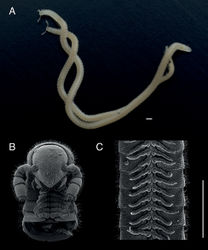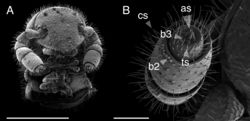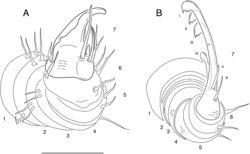Illacme
| Notice: | This page is derived from the original publication listed below, whose author(s) should always be credited. Further contributors may edit and improve the content of this page and, consequently, need to be credited as well (see page history). Any assessment of factual correctness requires a careful review of the original article as well as of subsequent contributions.
If you are uncertain whether your planned contribution is correct or not, we suggest that you use the associated discussion page instead of editing the page directly. This page should be cited as follows (rationale):
Citation formats to copy and paste
BibTeX: @article{Marek2023ZooKeys1167, RIS/ Endnote: TY - JOUR Wikipedia/ Citizendium: <ref name="Marek2023ZooKeys1167">{{Citation See also the citation download page at the journal. |
Ordo: Siphonophorida
Familia: Siphonorhinidae
Name
Illacme Cook & Loomis, 1928 – Wikispecies link – Pensoft Profile
Type species
Illacme plenipes Cook & Loomis, 1928.
Species included
Illacme plenipes Cook & Loomis, 1928; Illacme tobini Marek, Krejca & Shear, 2016; Illacme socal sp. nov.
Family placement
The genus Illacme is placed in the family Siphonorhinidae based on the following morphological characters: Head pear-shaped (♂) or triangular (♀), not elongate nor with a beak, as in the Siphonophoridae (♂ Suppl. materials 1, 9: figs S1, S2, S32, S34; ♀ Fig. 1; Suppl. material 11: figs S36, S39). Antennae elbowed between antennomeres 3, 4 (Figs 1, 2; Suppl. materials 1, 10, 11: figs S2–S4, S36, S41). Antennomere 1 set deep in cranium, not fully visible dorsally as in Siphonophoridae (Suppl. material 1: figs S2, S4). Antennomere 2 longer than wide, conical, not doughnut-shaped nor wider than long as typical in Siphonophoridae (Suppl. material 1: figs S1, S4). Anterior margin of collum straight, not medially emarginate as in Siphonophoridae. Sterna with prominent midline triangular ridge, projecting ventrally (Suppl. material 5: fig. S19). Posterior gonopods with distal podomere divided into 2–5 branches with one branch spike-like (i–v, Fig. 3B; Suppl. material 7: figs S25–S27). See also diagnoses of Illacme in Shelley (1996b[1]: 23), Marek et al. (2012[2]: 85; 2016[3]: 7), and Enghoff et al. (2015[4]: 386); and of Siphonorhinidae in Shelley and Hoffman (2004[5]: 218), Wesener (2014[6]: 417), and Enghoff et al. (2015[4]: 386).
Taxon Treatment
- Marek, P; Hall, C; Lee, C; Bailey, J; Berger, M; Kasson, M; Shear, W; 2023: A new species of Illacme from southern California (Siphonophorida, Siphonorhinidae) ZooKeys, 1167: 265-291. doi
Images
|
Other References
- ↑ Shelley R (1996b) The milliped order Siphonophorida in the United States and northern Mexico.Myriapodologica4: 21–33. http://www.vmnh.net/content/uploads/PDF/Research_and_Collections/Myriapodologica/Myriapodologica_v4_n4.pdf
- ↑ Marek P, Shear W, Bond J (2012) A redescription of the leggiest animal, the millipede Illacme plenipes, with notes on its natural history and biogeography (Diplopoda, Siphonophorida, Siphonorhinidae).ZooKeys241: 77–112. https://doi.org/10.3897/zookeys.241.3831
- ↑ Marek P, Krejca J, Shear W (2016) A new species of Illacme Cook & Loomis, 1928 from Sequoia National Park, California, with a world catalog of the Siphonorhinidae (Diplopoda, Siphonophorida).ZooKeys626: 1–43. https://doi.org/10.3897/zookeys.626.9681
- ↑ 4.0 4.1 Enghoff H, Golovatch S, Short M, Stoev P, Wesener T (2015) Diplopoda–taxonomic overview. In: Minelli A (Ed.) Treatise on Zoology – Anatomy, Taxonomy, Biology.The Myriapoda 2. Brill, Leiden, 363–454. https://doi.org/10.1163/9789004188273_017
- ↑ Shelley R, Hoffman R (2004) A contribution on the South African millipede genus, Nematozonium Verhoeff, 1939 (Siphonophorida: Siphonorhinidae).African Entomology12(2): 217–222.
- ↑ Wesener T (2014) First records of the order Siphonophorida from Madagascar and Mauritius (Diplopoda).Revue suisse de Zoologie121: 415–423. https://www.biodiversitylibrary.org/page/52965457


